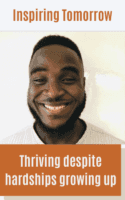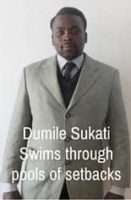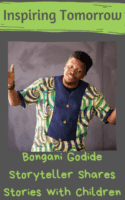The emergence of technology has undeniably made life easier. Who can even forget the times where you could only communicate with your relatives through written letters? Unathi Magubeni (35) from the Eastern Cape recalls how that dark era prepared him to be the established author he is today.
“I left my family in the EC and went to study further in Cape Town. I’d often write letters and they would write back. It was the first time I ever wrote a message straight from the heart because my school work was too structured and it lacked inspiration. From that point I developed a love of writing.”
Unathi says that reading was a new chapter in his life.
“The only books I had access to growing up were school prescribed books. I didn’t have any literature. I only read those books because it was compulsory to.”
His passion for wordplays and rhyme schemes got stronger.
“My friend, Vuyokazi Ngemntu, invited me to a poetry session and it was the first I ever attended such an event. I related to most of what they spoke about. They spoke about all the things I used to think when I was on my own. For the first time I felt so at home. I got the assurance that my thoughts were normal and I wasn’t losing my mind,” he says, jokingly.
That session sparked something and soon his creative juices were running.
“I was so inspired that I got home and started writing. I performed my first poem and the crowd was receptive and responsive. Someone came along and suggested that we publish my work and I didn’t even know that you could do that. We printed about 150 and we sold out, and reprinted. There I was making money off something that just came naturally.”
However, someone advised him to follow corporate because writing paid “peanuts”.
“In 2005 I worked at Old Mutual and there my creativity was killed. The only writing I did was reports and taking minutes. My colleagues thought my use of language was suitable for literature and would advise that I should go write a book rather. They told me, ‘You add your flavour in your writing but it might not necessarily work for business reports.’”
Unathi wasn’t sure whether the comments were complimentary! “It made me smile but it could not fill the void I felt inside me. I had forgotten about writing and it didn’t occur to me that it was exactly what was missing. It got to a point whereby I had this anxiety and was seeking for this freedom. I resigned and embarked on an entrepreneurial adventure.”
He realised he might’ve misinterpreted this ‘freedom’ he was longing for.
“I thought being my own boss would eventually give me this freedom I wanted, only to realise the anxiety was still there even after two years. The outside world didn’t motivate nor inspire me anymore. I had to sit down and really dig deep within. I had to ask myself what was it that I loved whole-heartedly. Other people aspired to be doctors, pilots, lawyers, but writing was one thing that completed my puzzle. ”
The edge to pick up a pen was strong, so he did the right thing.
“November 2009 I wrote a paragraph and showed it to a friend. He told me to continue. I left to go to East London for holidays but I couldn’t go back to Cape Town. I left my flat and all my belongings there. I left my shoes and clothes and was only left with a couple of pants. Took a pen and a paper ndawela inciba (and crossed the Great Kei River) and started my journey.
“I wasn’t going to any particular person, I stopped from one stranger’s family to another. I was doing my writing as I went on with my journey. I’d write if I had something and stop if I had to force it out. I wrote my manuscript in the 2011 year of the Shades of Grey.”
Unathi says he had authors he looked up to, but wanted to surpass them nevertheless.
“Our heroes inspire us but we mustn’t shrink ourselves. We must stand shoulder to shoulder next to our heroes. I wanted to create work that would be on a par with my hero. I wanted to take the torch from him and move it forward. I’d tell people I wanted to take the torch and they couldn’t handle that. They asked themselves who was I to think I could stand toe to toe with him.”
Unathi’s efforts were dismissed as “too ambitious.”
“No one was paying me any mind. Some didn’t want to read the script and those who did give me any concrete reason as to why they were rejecting it.”
It was at this point that friends disassociated with him, and in 2011 he yielded to ancestral calling and came back in 2014.
“There were things I wanted to contribute to the paradigm. There’s a lot of disharmony in our society. We are surrounded by disharmony and negativity in our media. If you feed yourself with negativity, what will your attitude be? I wanted to create a piece of art filled with harmony so the reader could take in the peace.”
His prominent and breath-taking book Nwelezelanga – The Star Child saw the light of day in 2014.
“I shared the first chapter but only a few even acknowledged it. I kept sending the chapter to people and I could see what the book could potentially do. I didn’t want to write a big book. I wanted to compress the energy and create dynamite. It was time for the naked truth to come to the fore.”
It may have seen the light of day, but rejections and critics put the light off.
“They wanted to turn my strong points into weaknesses. They wanted me to shrink and produce mediocre writing. I think it was too much for their understanding. My resolution for 2015 was to get a publisher. I needed to use myself as the guinea pig. They usually say shoot for the sky so you can end up hitting the clouds, but I wanted to shoot for the galaxy so my fall would be on the globe.
Believing is reality, and reality is existence. We were testing magic.”
2015 came with its disappointments too.
“Some declined but some were blown away and I couldn’t understand it. Offers came but they weren’t fitting the dream. The dream was to reach mainstream audience so we can disturb the disharmony. We turned down offers because we needed one of the top five publishers. November I realised I wasn’t following my own formula. If I say believing is reality, and reality is existence then I first had to believe that I was already published and meditate on that emotion.”
He adds he contacted friends and asked them to help with marketing the book. The formula was to talk things into being.
“1st of December 2015 I sent the manuscript to the only publisher that was left in my list at midnight. I woke up to a ‘Welcome home’ message. I had proven my formula works; but remember the dream was to ‘reach many’, so the journey continued.”
Sceptical people and pessimists, again, tried to discourage his dream of selling million copies.
“They said I should manage my expectations cos ‘fiction doesn’t sell here’. I work with medicine, I’m traditional healer. We needed to heal but it’d be impossible to reach many. We needed to package it in a way that’d reach more people quicker so the book could carry mass healing.”
The book hit book the stores in May 2016. “They tell me it has outsold fiction lifetime expectations in just four months,” he says.
Unathi has just gotten an invitation to be a member of the acclaimed worldwide association of writers, PEN Association.
“I got a call to fix my passport cos I’m going to Nigeria in November. People apply to be part of PEN but I was invited to it. I’m saying this cos I first had to believe the book would be big and now I can see the magic playing out.”
Unathi acknowledges his readers for the positive feedback and everyone who’s made it possible for him to publish the book.
“Follow your dreams cos they’ve chosen you as much as you’ve chosen them. Colonise your mind with your heart’s desire until it makes you so uncomfortable that you just have get up and turn your dreams into reality. Force will spring one into action. Remember how people thought my dreams were unrealistic? Don’t allow people to shrink your reality and limit your dreams,” he wraps up.
Nwelezelanga – The Star Child is available at the Book Lounge and Exclusive Books.






